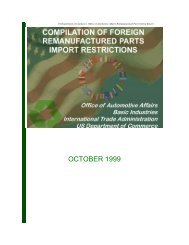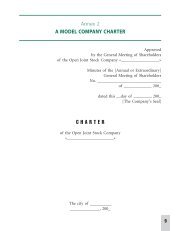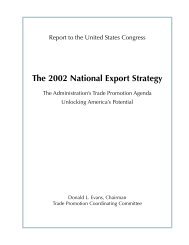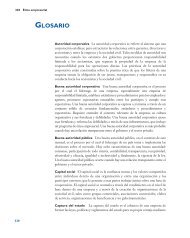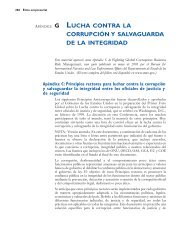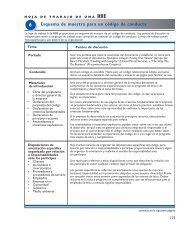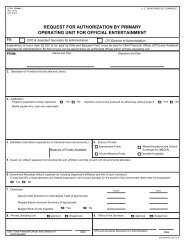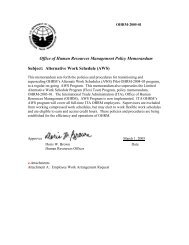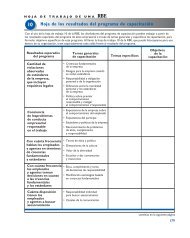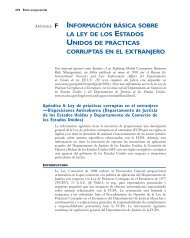Global Steel Trade; Structural Problems and Future Solutions
Global Steel Trade; Structural Problems and Future Solutions
Global Steel Trade; Structural Problems and Future Solutions
Create successful ePaper yourself
Turn your PDF publications into a flip-book with our unique Google optimized e-Paper software.
3.4 The Brazilian <strong>Steel</strong> Industry:<br />
Protection at Home Supports Exports Abroad<br />
Introduction<br />
Brazilian steel producers have long reaped the benefits of a home market insulated from competition from<br />
abroad <strong>and</strong> lacking any meaningful competition at home. This sheltered domestic market provides the<br />
Brazilian steel industry a secure, profitable base from which to compete to increase or retain export volumes<br />
irrespective of the kind of market volatility seen in 1997 <strong>and</strong> 1998. However, to the extent that Brazilian steel<br />
companies take advantage of an insulated home market, the potential for unfair trade exists.<br />
• Cartel-Like Behavior. Tactics employed by Brazil’s steel sector to manage competition at home<br />
include collusion to raise prices. 1 Cartel-like behavior is fostered by segmentation of the market <strong>and</strong> the<br />
maintenance of strong cross-ownership ties to solidify cooperation.<br />
• Import Barriers. These practices would not succeed without a number of import barriers, supported by<br />
government <strong>and</strong> industry, to minimize foreign competition, including high import tariffs <strong>and</strong> taxes,<br />
import licensing barriers <strong>and</strong> “captive” distribution channels.<br />
An Oligopolistic <strong>Steel</strong> Industry at Home<br />
Anticompetitive practices among the large Brazilian steel firms allow the domestic industry to operate in an<br />
atmosphere effectively sheltered from market forces. This environment enables Brazilian producers to<br />
maintain domestic prices at artificially high levels 2 while lowering export prices on certain products to<br />
increase or maintain export sales. Of particular concern is the cartel-like behavior of CSN, Usiminas, <strong>and</strong><br />
Cosipa—three companies that account for almost half of total crude steel production in Brazil. 3, 4 (See<br />
boxes, this page <strong>and</strong> the next.) 5<br />
Cartel-Like Behavior<br />
In 1997, Brazilian authorities found that these three producers conspired to fix domestic prices. The<br />
Secretaria de Acompanhamento Economico (SEAE)—the Economic Monitoring Secretariat of the<br />
government of Brazil—concluded in a July 1997 report that “a cartel had been formed in connection with<br />
the increase in sales prices of ordinary flat steel products implemented by CSN, Usiminas, <strong>and</strong> Cosipa.” 6<br />
Profile: Brazil’s Largest <strong>Steel</strong> Company<br />
CSN, Brazil’s largest steel producer, was established as a government-owned steel company in the<br />
1940s. After transfer of ownership in 1974 to SIDERBRAS (a government holding company) <strong>and</strong><br />
subsequent privatization auctions in the early 1990s, CSN was free of direct government ownership<br />
by 1994. At present, CSN is owned by iron ore producer CVRD (Companhia Vale do Rio Doce, which<br />
holds 10 percent) <strong>and</strong> a consortium of private investors including Bradesco Bank, Vicunha Group,<br />
Previ (the pension fund of state-owned Banco do Brasil, Brazil’s biggest bank) <strong>and</strong> CSN employee<br />
funds. CSN also holds 31 percent of the voting shares of Valepar, a company which in turn owns 61<br />
percent of the voting shares of CVRD.<br />
CSN is a major Brazilian producer of flat-rolled products, including hot-rolled sheet <strong>and</strong> strip, coldrolled<br />
sheet <strong>and</strong> strip <strong>and</strong> coated sheet <strong>and</strong> strip, <strong>and</strong> is the world’s largest single-mill producer of tin<br />
plate, a type of coated, flat steel product. In 1998, CSN sold 38 percent of all hot, flat-rolled steel, 31<br />
percent of all cold, flat-rolled steel, 75 percent of all galvanized steel <strong>and</strong> 97 percent of all tin-coated<br />
steel produced in Brazil.<br />
98 <strong>Global</strong> <strong>Steel</strong> <strong>Trade</strong>: <strong>Structural</strong> <strong>Problems</strong> <strong>and</strong> <strong>Future</strong> <strong>Solutions</strong>



